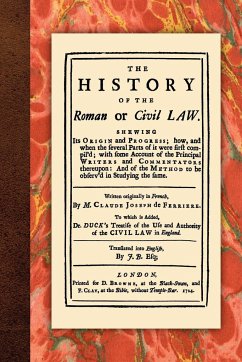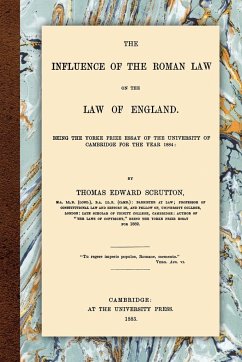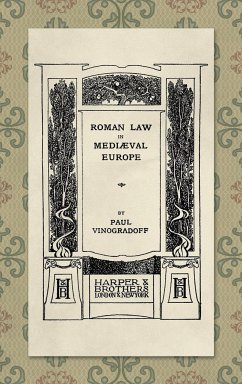Through the influence of Doctors' Commons and the universities the civilians played an important role in the development of English law, especially in the fields of commercial, estate and admiralty law. Despite its value, study of the civil law had entered a moribund phase by the eighteenth century. Several student handbooks attempted to correct this deficiency, and Beaver's translation of Ferriere's treatise is among the best. Accompanied by Duck's learned essay that connects the civil law to the common law, the work is among the first in English to establish the confluence of these legal traditions. Also included is Beaver's translation of The History of the Origine of the French Laws, Translated from the French by J.B. Esq., Shewing, the Analogy of the Laws of the Antient Gauls and Britons. First published anonymously in 1703, it has been attributed to Ferriere, Gabriel Argou and Claude Fleury. Claude Joseph de Ferriere [ca. 1680-ca. 1750] was a well known French jurisconsult, dean of the Faculty of Law in Paris and the author of legal treatises and an important legal dictionary, Dictionnaire de Droit et de Pratique. CONTENTS Chap. I. Of the Different Forms of Government in Rome Chap. II. Of the Roman Law under the Regal Government Chap. III. Of the Free State of Rome in its Infancy, and the Creation of consuls Chap. IV. Of the Creation of Tribunes of the People Chap. V. Of the Decemviri, and Law of the Twelve Tables Chap. VI. Of the Consequences that attended the Law of the Twelve Tables Chap. VII. Of the Laws Chap. VIII. Of the Plebiscita Chap. IX. Of the Interpretation of the Lawyers Chap. X. Of the Prætor's Edicts Chap. XI. Of the Roman Law under the Emperors Chap. XII. The Succession of the Emperors to Justinian Chap. XIII. Of the Emperor Justinian Chap. XIV. Of the Roman Senate Chap. XV. Of the Senatus-Consulta Chap. XVI. Of the Lawyers Answers Chap. XVII. Of the most Celebrated Roman Lawyers Chap. XVIII. Of the Law-Books before Justinian's Time Chap. XIX. Of Justinian's Code Chap. XX. Of the Digests or Pandects Chap. XXI. Of Justinian's Institutes Chap. XXII. Of the Second Edition of Justinian's Code Chap. XXIII. Of Justinian's latter Constitutions, called Novels Chap. XXIV. Of the Law obscrv'd in the East, after Justinian's Death Chap. XXV. Of the Law obscrv'd in the West, after Justinian's Death Chap. XXVI. Of the Use of the Roman Law in France Chap. XXVII. The Decretal Epistle Super-specula explain'd Chap. XXVIII. The Sixty ninth Article of the Ordonnance of Blois explain'd Chap. XXIX. Of the Excellency of the Roman Law Chap. XXX. Of the most celebrated Interpreters of the Roman Law Chap. XXXI. Of the Dispositions requir'd for the Study of the Roman Law Chap. XXXII. Of the Method to be observ'd in studying the Roman Law Chap. XXXIII. Of the Quotations and Abbreviations






![An Analysis of the Civil Law [1836] An Analysis of the Civil Law [1836]](https://bilder.buecher.de/produkte/63/63322/63322153n.jpg)

